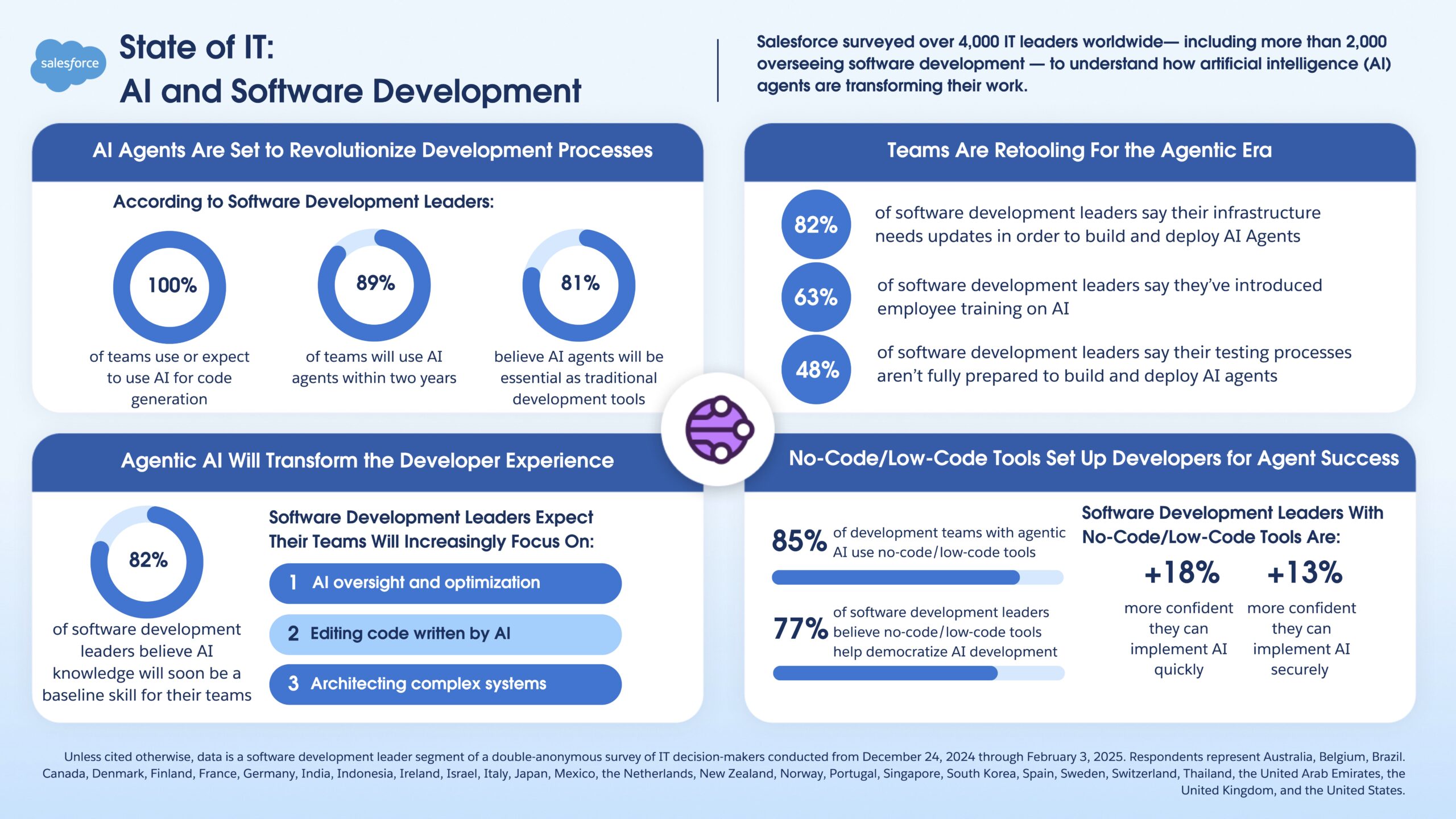The role of the developer is undergoing a huge shift due to the influence of artificial intelligence (AI) and the emergence of low-code and no-code platforms. AI agents are helping to shift developers’ focus from long hours of manual coding to high-value problem-solving, architecture and decision-making processes.
We are seeing developers embrace this change: Salesforce’s recent State of IT survey reveals that a staggering 96% of developers are excited about AI’s impact on their careers. This isn’t just about automation; it’s about augmentation. The survey findings also show that developers are eager to use AI agents for tasks such as debugging, generating test cases and handling repetitive code, which helps them focus on higher-level challenges such as architecting complex systems and AI oversight.

Enter Agentic AI: A New Era of Development
This shift is powered by what we call ‘agentic AI’. AI agents are a type of AI system that can understand and respond to customer inquiries without human intervention. These intelligent agents assist developers throughout the software development lifecycle, from writing and reviewing code to optimizing performance. They act as force multipliers in the development process, enhancing speed and reducing time spent on repetitive tasks.
For experienced developers who know how to write complex code, collaboration with AI agents speeds up the development process — unlocking even more productivity. For instance, our Agentforce for developers has already generated seven million lines of code for customers, and 25–28% of new code is AI-generated and deployed to production.
Democratizing App Development
The emergence of low-code and no-code tools is democratizing application development, and AI could reduce barriers even more by allowing more people than ever before to execute developer-focused tasks. Our developer survey found that more than three-quarters of developers say that low-code and no-code tools can help democratize and scale AI development.
These new tools are empowering developers of all skill levels to build and deploy apps and AI agents, scaling development efforts and fostering innovation. Low-code developers will play an exciting role, enabling actions within AI agents, as AI agent tools bring more people — such as beginner developers, into the development process using natural language.
This democratization empowers a broader range of users to participate in development, enabling them to create solutions tailored to their specific needs without traditional programming expertise. Ultimately, this shift accelerates innovation by enabling faster prototyping and deployment, fostering a more inclusive and dynamic development landscape.
The New Developer Scorecard
With AI agents transforming the developer experience and improving application development speed, tech leaders need to rethink what developer productivity looks like to encourage developers to focus on creativity, innovation and further building their careers.
For many years, we have measured developer productivity based on the number of lines of code written and bugs resolved. But in the age of AI, these metrics are becoming relics of the past. We’re entering an era where the impact of a developer’s work takes center stage, with AI agents as the catalysts.
Our research shows that 92% of developers are looking to measure their productivity based on impact (i.e., contribution to business goals, user experience improvements and reduced incidents) over output (i.e., lines of code written and bugs fixed).

To measure productivity in the agentic AI era and incentivize new ways of working, developers should assess the entire software lifecycle, from ideation to deployment. New key performance indicators (KPIs) could include:
- Time to value: This is how quickly a developer can take an idea from concept to deployment with the help of an agent. For example, Secret Escapes offers discounted luxury travel hotels and luxury worldwide and uses AI agents to deliver more efficient customer support to unique and last-minute requests from its travelers. With Agent Builder, a low-code builder tool for Agentforce, the Secret Escapes team was able to build, test and launch their agent to support customer service in just two weeks, compared to the six months it had previously taken the company to build and train a bot.
- Software supply chain efficiency: This examines how well developers integrate AI agents into workflows and reduce friction points across planning, coding, testing, deployment and security to optimize processes holistically. For example, at Salesforce, our software engineers have embedded AI across their software development toolchain, taking advantage of agentic experiences to suggest solutions for solving technical problems. The AI integration encompasses code and test generation, code explanation, refactoring and identifying bugs and security vulnerabilities.
- User experience improvements: This looks at the impact of the developers’ work on the end user or customer experience. One of our Trailblazers, a Salesforce architect at Google, evolved his role from writing and reviewing code as a developer to strategic design as an architect. His work involved optimizing internal workflows and automating processes for other teams. For instance, he streamlined data management for internal teams, replacing cumbersome spreadsheets with automated, connected systems. He’s also looking to incorporate agents so he can further focus on business impact, such as enhancing customer experience.
Empowering Developers in the Age of AI
By automating mundane tasks and speeding up the development process, AI agents allow developers to focus on more interesting tasks, such as user experience and strategic decision-making. This leads to more fulfilling work and faster career advancement, with 92% of developers believing AI agents will help them progress.
This shift also presents challenges. For instance, there is a strong need for upskilling, as more than eight in 10 developers recognize that AI knowledge will soon be a baseline skill. However, survey respondents also identified opportunities for training on technical AI skills and redefining current roles as the most important areas for employers to provide support.
By embracing AI agents and enabling developers to become AI orchestrators, organizations can unlock unprecedented levels of innovation and efficiency, ultimately reshaping the developer experience for the better.




